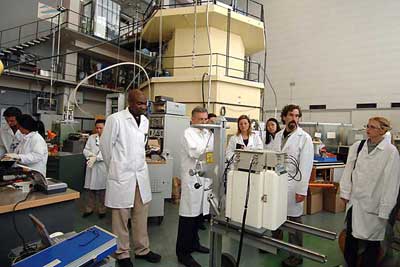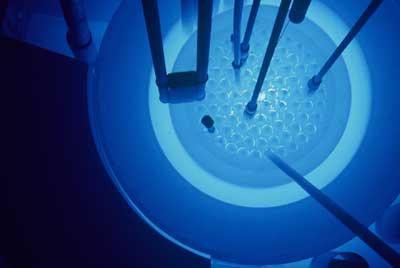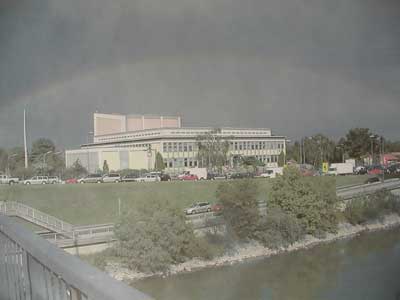
European
Nuclear Society
e-news
Issue 24 Spring 2009
http://www.euronuclear.org/e-news/e-news-24/training&education.htm

H. Böck
Vienna University of Technology,
Atomic Institute of the Austrian Universities
Stadionallee 2,
1020 Wien, Austria
boeck@ati.ac.at
1. National Activities
The Atomic Institute of the Austrian Universities was founded in 1959 as an inter-university institute where students from all Austrian universities can carry out postgraduate specialisation in the fields of:
Neutron- and Solid State Physics
Nuclear Technology
Radiochemistry
Low Temperature Physics
Radiation Protection
Nuclear- and Astrophysics
X-Ray Physics

According to the university curricula, students have to enrol in a certain number of practical and theoretical courses that have to be completed with a practical Masters Thesis. The Atomic Institute of the Austrian Universities offers today about 80 theoretical and 10 practical courses in the aforementioned fields. Two courses in particular, those on “Reactor Physics and Kinetics” and on “Reactor Instrumentation and Control” attracted many students as they were trained using the TRIGA Mark II reactor. The students work in a group of 4-5 students. They have to summarise their results and a written test completes the course, which is valued with 3 ECTS. The different exercises included in the “Reactor Physics and Kinetics” course are as follows:
Measurement of thermal neutron flux density in the reactor core
Measurement of epithermal and fast neutron flux density in the reactor core
Determination of the importance function and the void-coefficient
Determination of neutron absorption cross section according to the danger coefficient method
Measurement of the reactor period
Radiation protection around a research reactor
Critical experiments
Control rod calibration and determination of core excess reactivity
Sub-critical safety rod calibration
Determination of the reactivity value of uranium fuel and graphite elements in different core positions
Reactor power calibration and determination of the temperature coefficient of the reactivity
Demonstration of a reactor pulse with different reactivity insertion
The exercises in the “Reactor Instrumentation and Control” course are as follows:
Introduction to typical reactor instrumentation
Reactor safety principles
Calibration of nuclear channels
Measurement of control rod drop times
Neutron flux measurement with compensated ionisation chambers
Fission chambers
Self-powered neutron detectors
Simulator program for PWR

Austria’s strong anti-nuclear policy and the Chernobyl accident reduced the number of MS and PHD students in the nuclear field up to about 1995. Since the mid-90s, the number of students in nuclear technology has once again increased due to two facts:
Increased cooperation with the IAEA
The decommissioning of the 10 MW ASTRA reactor at Seibersdorf, in July 1999
During that period bilateral cooperation with the Czech Republic and the Slovak Republic increased at university level thanks to student exchange programmes and student visits. This will be important later within the context of trans-national cooperation and knowledge exchange.
Since the mid-90s, the Atomic Institute has also been heavily involved in public discussions on Eastern European VVER NPP’s as the Austrian Government created a “Nuclear Forum” in support of its anti-nuclear policy towards neighbouring countries. The Atomic Institute remained a scientific and technical centre of nuclear competence that was strongly ignored by the Austrian media but highly appreciated as a discussion partner for the New EU Member States.
The strong ties between the Atomic Institute and the IAEA are reflected in many cooperative activities, especially in the development of soft and hardware programmes related to safeguards and security instrument development. In many projects the IAEA received high quality academic work and the students were supported financially by the IAEA. Some of the students were later employed by the IAEA due to their excellent scientific and technical knowledge.

2. International Activities
As the largest international initiative in the field of nuclear education the Atomic Institute took part in the ENEN and NEPTUNO projects, producing an extensive catalogue of all nuclear educational activities at European universities. This document remains today a very valuable document for the follow-up projects.
These cooperative ventures with other European universities initiated and resulted, typically, in the creation of an international course offered jointly by four universities (Bratislava, Budapest, Prague and Vienna) called the Eugene Wigner Course, which has been on offer to students since 2005. The 15 students and young professionals enrolled in the course rotate in groups of 5 between 4 universities. They carry out practical experiments at 3 different research reactors. The course is also credited according to the Bologna agreement by the home universities of the students with 3 ECTS.
Another co-operative venture was started in 2007 with the signing of a contract with the Dalton Institute/University of Manchester. Within the Nuclear Technological Education Centre (NTEC) two groups with maximum 6 students spend a week of practical training in reactor physics and kinetics and in reactor instrumentation and control with the TRIGA reactor of the Atomic Institute. In addition to this training programme, another UK group with participants from the Royal Navy and Rolls-Royce takes part annually in a practical training course at the Atomic Institute.
In addition, for a few years now the Atomic Institute also cooperates with the TU Bratislava in the Slovak Republic in the retraining of staff members of the Bohunice and Mochovce NPPs. Groups of 4 staff members carry out selected experiments from the aforementioned course list, which they carry out over 3 days. Selected Powerpoint presentations on subjects of interest are included.
Another important international co-operative venture is the participation of the Atomic Institute in an EU project called Integrated Infrastructure Initiative for Material Testing Reactors Innovations (MTR+I3), which focuses on preparing for the operation and utilisation of the Jules Horowitz Reactor (JHR). The Atomic Institute has taken over the Work Package Leadership 2 training programme for reactor staff, in cooperation with Belgium, the Czech Republic, France, Greece and Portugal. The programme is divided into three tasks which deals with:
Defining target groups for training and needs in the MTR field and potential candidates each year
Training in a variety of nuclear fields (academic and practical) with such training bodies as ENEN, NEPTUNO, and under the Eugene Wigner course (multinational training course involving Austria, the Czech Republic, Hungary and the Slovak Republic that is supported also by the IAEA)
Define training programmes adapted to the particular needs of the various target groups. Integration of MTR programmes in the European training programmes. Training programmes can be completed at two complementary sites and new modules dedicated to MTR within existing programmes are also offered in order to attract young people to the MTR field
3. Conclusions
Although the Atomic Institute operates within a strictly anti-nuclear environment that is supported by politically motivated and continuously negative media information, the Atomic Institute manages nonetheless to carry out its international programmes successfully. Indeed, these programmes have even increased significantly over the past decade. Both the local students and foreign users appreciate the possibility of having hands-on training at a research reactor – something that is not available in many countries. Located in the heart of Europe and being the closest nuclear facility to the IAEA, the Atomic Institute plays an important role in nuclear knowledge management, education and training. In addition the Atomic Institute also helps to improve international relations in the nuclear field by active co-operation even though it must work within in nuclear-hostile environment.
![]()
© European Nuclear Society, 2009